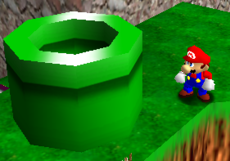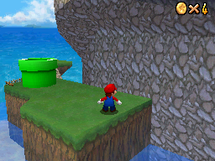Shrinker Pipe: Difference between revisions
Doomdorm64 (talk | contribs) No edit summary |
Doomdorm64 (talk | contribs) mNo edit summary |
||
| Line 7: | Line 7: | ||
|width2=215 | |width2=215 | ||
|footer=Mario near a Shrinker Pipe in ''Super Mario 64'' (left) and ''Super Mario 64 DS'' (right) | |footer=Mario near a Shrinker Pipe in ''Super Mario 64'' (left) and ''Super Mario 64 DS'' (right) | ||
}}'''Shrinker Pipes'''<ref>M. Arakawa. ''Super Mario 64'' [[Nintendo Power|Player's Guide]]. Pages 107–109 and 111.</ref> are objects that appear in ''[[Super Mario 64]]'' and [[Super Mario 64 DS|its remake]], exclusively in the level [[Tiny-Huge Island]]. Though they look visually similar to [[Warp Pipe]]s and use the same sound effects, they do not transport the player anywhere. Instead, they change the user's size, making them either much larger or much smaller than their surroundings. However, a Shrinker Pipe changes to be the size of the player, and the player looks the same size on the screen, leading to the illusion of the island itself shrinking or growing. Using a Shrinker Pipe also resets certain events, such as the race with [[Koopa the Quick]], allowing them to be reattempted without exiting the stage. | }} | ||
'''Shrinker Pipes'''<ref>M. Arakawa. ''Super Mario 64'' [[Nintendo Power|Player's Guide]]. Pages 107–109 and 111.</ref> are objects that appear in ''[[Super Mario 64]]'' and [[Super Mario 64 DS|its remake]], exclusively in the level [[Tiny-Huge Island]]. Though they look visually similar to [[Warp Pipe]]s and use the same sound effects, they do not transport the player anywhere. Instead, they change the user's size, making them either much larger or much smaller than their surroundings. However, a Shrinker Pipe changes to be the size of the player, and the player looks the same size on the screen, leading to the illusion of the island itself shrinking or growing. Using a Shrinker Pipe also resets certain events, such as the race with [[Koopa the Quick]], allowing them to be reattempted without exiting the stage. | |||
There are three Shrinker Pipes on Tiny-Huge Island. One is located near the [[level]]'s start, on the same platform as the [[Small Piranha]]s or [[Big Fire Piranha|Piranha Flower]]s. A second is located at the base of the mountain, above the source of the [[Big Steely|iron balls]]. The third is located on the opposite corner of the island from the level's start, at the point where the race with Koopa the Quick ends. | There are three Shrinker Pipes on Tiny-Huge Island. One is located near the [[level]]'s start, on the same platform as the [[Small Piranha]]s or [[Big Fire Piranha|Piranha Flower]]s. A second is located at the base of the mountain, above the source of the [[Big Steely|iron balls]]. The third is located on the opposite corner of the island from the level's start, at the point where the race with Koopa the Quick ends. | ||
Revision as of 09:37, May 5, 2023
Shrinker Pipes[1] are objects that appear in Super Mario 64 and its remake, exclusively in the level Tiny-Huge Island. Though they look visually similar to Warp Pipes and use the same sound effects, they do not transport the player anywhere. Instead, they change the user's size, making them either much larger or much smaller than their surroundings. However, a Shrinker Pipe changes to be the size of the player, and the player looks the same size on the screen, leading to the illusion of the island itself shrinking or growing. Using a Shrinker Pipe also resets certain events, such as the race with Koopa the Quick, allowing them to be reattempted without exiting the stage.
There are three Shrinker Pipes on Tiny-Huge Island. One is located near the level's start, on the same platform as the Small Piranhas or Piranha Flowers. A second is located at the base of the mountain, above the source of the iron balls. The third is located on the opposite corner of the island from the level's start, at the point where the race with Koopa the Quick ends.
Magic Doors from Super Mario Bros. 3 provide a similar function for the similar world in that game.
References
- ^ M. Arakawa. Super Mario 64 Player's Guide. Pages 107–109 and 111.

